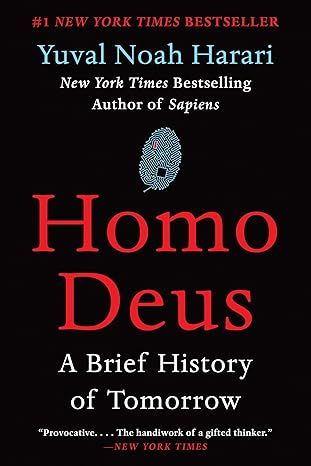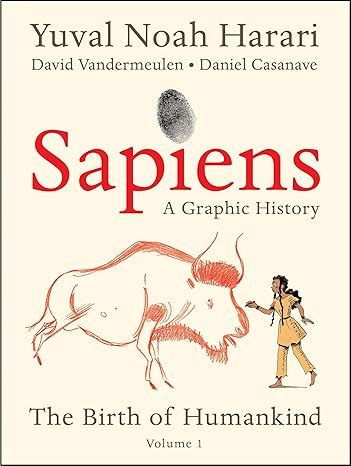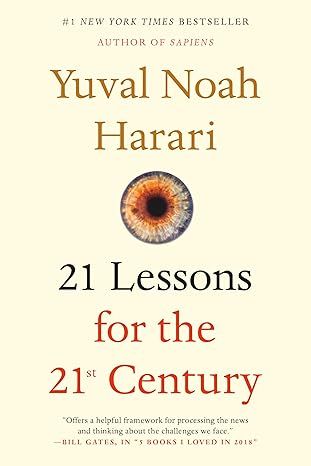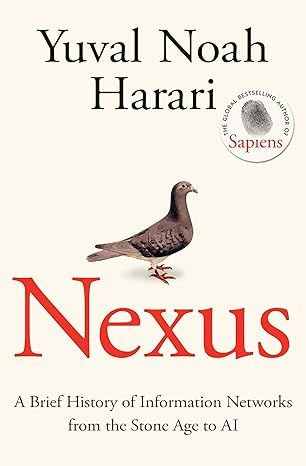Homo Deus: A Brief History of Tomorrow
4.5
-
36,324 ratings
Official U.S. edition with full color illustrations throughout.
NEW YORK TIMES BESTSELLER
Yuval Noah Harari, author of the critically-acclaimed New York Times bestseller and international phenomenon Sapiens, returns with an equally original, compelling, and provocative book, turning his focus toward humanity’s future, and our quest to upgrade humans into gods.
Over the past century humankind has managed to do the impossible and rein in famine, plague, and war. This may seem hard to accept, but, as Harari explains in his trademark style—thorough, yet riveting—famine, plague and war have been transformed from incomprehensible and uncontrollable forces of nature into manageable challenges. For the first time ever, more people die from eating too much than from eating too little; more people die from old age than from infectious diseases; and more people commit suicide than are killed by soldiers, terrorists and criminals put together. The average American is a thousand times more likely to die from binging at McDonalds than from being blown up by Al Qaeda.
What then will replace famine, plague, and war at the top of the human agenda? As the self-made gods of planet earth, what destinies will we set ourselves, and which quests will we undertake? Homo Deus explores the projects, dreams and nightmares that will shape the twenty-first century—from overcoming death to creating artificial life. It asks the fundamental questions: Where do we go from here? And how will we protect this fragile world from our own destructive powers? This is the next stage of evolution. This is Homo Deus.
With the same insight and clarity that made Sapiens an international hit and a New York Times bestseller, Harari maps out our future.
Read more
Kindle
$0.00
or $17.49 to buy
Audiobook
$0.00
with membership trial
Hardcover
$20.71
Paperback
$20.79
Ships from
Amazon.com
Payment
Secure transaction
ISBN-10
0062464345
ISBN-13
978-0062464347
Print length
464 pages
Language
English
Publisher
Harper Perennial
Publication date
September 03, 2018
Dimensions
6 x 1.12 x 9 inches
Item weight
2.45 pounds
Popular Highlights in this book
The most common reaction of the human mind to achievement is not satisfaction, but craving for more.
Highlighted by 8,114 Kindle readers
In most cases, this overreaction to terrorism poses a far greater threat to our security than the terrorists themselves.
Highlighted by 6,313 Kindle readers
Yet in fact modernity is a surprisingly simple deal. The entire contract can be summarised in a single phrase: humans agree to give up meaning in exchange for power.
Highlighted by 6,296 Kindle readers
Product details
ASIN :
B01BBQ33VE
File size :
13648 KB
Text-to-speech :
Enabled
Screen reader :
Supported
Enhanced typesetting :
Enabled
X-Ray :
Enabled
Word wise :
Enabled
Editorial Reviews
Review
Praise for Sapiens: A Brief History of Humankind:
"Here is a simple reason why Sapiens has risen explosively to the ranks of an international bestseller. It tackles the biggest questions of history and of the modern world, and it is written in unforgettably vivid language." —Jared Diamond, Pulitzer Prize-winning author of Guns, Germs, and Steel
Praise for Homo Deus:
"Homo Deus will shock you. It will entertain you. Above all, it will make you think in ways you had not thought before." —Daniel Kahneman, author of Thinking, Fast and Slow
"Israeli Professor Harari is one of today’s most exciting and provocative thinkers. His innovative new book blends science, history and philosophy to explore the future of humanity in the face of artificial intelligence and examine whether our species will be rendered completely redundant." —Cambridge Network
"Spellbinding. . . . This is a very intelligent book, full of sharp insights and mordant wit. . . . Its real power comes from the sense of a distinctive consciousness behind it. It is a quirky and cool book, with a sliver of ice at its heart. . . It is hard to imagine anyone could read this book without getting an occasional, vertiginous thrill." —The Guardian
"It’s a chilling prospect, but the AI we’ve created could transform human nature, argues this spellbinding new book by the author of Sapiens." —The Guardian
"Nominally a historian, Harari is in fact an intellectual magpie who has plucked theories and data from many disciplines — including philosophy, theology, computer science and biology — to produce a brilliantly original, thought-provoking and important study of where mankind is heading." —Evening Standard
"Harari’s work is . . . an unsettling meditation on the future. He’s opened a portal for us to contemplate on what kind of relationships we are forming with our data-crunching machines and whether ‘right’ must be determined by empirical evidence or good old 'gut instinct.'" —The Hindu
"[Harari’s] propositions are well-developed, drawing upon a combination of science, philosophy and history. While the book offers a rather pessimistic and even nihilistic view of man’s future, it is written with wit and style and makes compelling reading." —iNews
About the Author
Prof. Yuval Noah Harari, bestselling historian and philosopher, is considered one of the world’s most influential intellectuals today. His popular books—including Sapiens: A Brief History of Humankind; Homo Deus: A Brief History of Tomorrow; 21 Lessons for the 21st Century; and the series Sapiens: A Graphic History and Unstoppable Us—have sold more than 45 million copies in 65 languages. Harari co-founded Sapienship, a social impact company with projects in the fields of education and storytelling, whose main goal is to focus the public conversation on the most important global challenges facing the world today. Harari has a PhD in history from the University of Oxford and currently lectures in the department of history at the Hebrew University of Jerusalem.
Read more
About the authors
Yuval Noah Harari
Prof. Yuval Noah Harari (born 1976) is a historian, philosopher and the bestselling author of 'Sapiens: A Brief History of Humankind' (2014); 'Homo Deus: A Brief History of Tomorrow' (2016); '21 Lessons for the 21st Century' (2018); the children's series 'Unstoppable Us' (launched in 2022); and 'Nexus: A Brief History of Information Networks from the Stone Age to AI' (2024). He is also the creator and co-writer of 'Sapiens: A Graphic History': a radical adaptation of 'Sapiens' into a graphic novel series (launched in 2020), which he published together with comics artists David Vandermeulen (co-writer) and Daniel Casanave (illustrator). These books have been translated into 65 languages, with 45 million copies sold, and have been recommended by Barack Obama, Bill Gates, Natalie Portman, Janelle Monáe, Chris Evans and many others. Harari has a PhD in History from the University of Oxford, is a Lecturer at the Hebrew University of Jerusalem's History department, and is a Distinguished Research Fellow at the University of Cambridge’s Centre for the Study of Existential Risk. Together with his husband, Itzik Yahav, Yuval Noah Harari is the co-founder of Sapienship: a social impact company that advocates for global collaboration, with projects in the realm of education and storytelling.
Read more
Reviews
Customer reviews
4.5 out of 5
36,324 global ratings
David Walter
5
Encompassing perspective
Reviewed in the United States on December 5, 2020
Verified Purchase
In Homo Deus, Yuval Noah Harari brings a broad and encompassing historical view to bear on big-picture trends, dynamics and questions that are front and center in our world today, and in doing so shines a multifaceted light on what makes people what they are, how we’ve come to the place we are now and where we’re going. Starting with the omnipresent elements that threatened the survival of our ancestors and seeing how we managed those threats, Harari draws in many different threads: why we created and value religion; why we create the technology we do to address certain problems, and how our technology has evolved; the role of science in our lives; why we seek happiness and what it’s like to achieve happiness; how our relationship with the natural world has changed as we changed from hunter-gatherers to agriculturalists; the nature of the human soul; that humans are at their core emotional organisms; and so much more. The observations Harari makes and the conclusions he draws aren’t necessarily the obvious ones, but his logic and perspective and how he comes to his rationale are clear, and make for compelling reading.
Accurately predicting where the human species is headed, predicting what the evolution of technology will create and predicting the political and social dynamics of future populations is impossible – there are simply too many variables being influenced by too many elements to know what’s going to happen in the future. But the predictions Harari makes in Homo Deus don’t emanate from a belief in what will happen as much as from a historian’s view of what could happen, given our story up to now and the elements we’re composed of. Homo Deus gives us a chance to deeply assess who we are and how we’ve come to where we are. It makes for fascinating, thought-provoking reading.
This is an exceptional book. If you are drawn to big-picture views of humans and our place in the world, this book is valuable. Whether you agree with all that’s written here or not, what Harari has drawn together will give you many threads of valuable input, and offers much to chew on.
Read more
P. Schuyler
5
Intriguing and profound
Reviewed in the United States on March 31, 2017
Verified Purchase
Sapiens is among my favorite books, and its full of fascinating ideas. To my eyes, that book firmly established that its the Inter-subjective realm (our ability to create and share fictions) that gives humanity its power in nature, and essentially separates us from other animals. He makes an absolutely compelling and practical case for that. I managed to get through years of College philosophy without realizing anything even remotely similar to that. And how that has changed my worldview! Ever since I read that book I can understand better the madness of the modern world; our religions, nation-states, companies and media personalities. What was formerly incomprehensible; people glued to their cell phones and Facebook profiles, throngs chanting midevil rituals on Sunday, wild celebrity worship, bizarre legal and religious doctrines, bureaucracy and its true power, all these mysteries are suddenly clear and connected thanks to Sapiens.
Homo Deus summarizes the fundamentals of Sapiens in the first half of the book. Then it goes to dramatic new places which are a projection and warning about modern technologies and trends. To me his writing is always carefully and reasonably articulated and he states plainly when and where he is speculating. Sure he draws many extrapolations forward but that's the point of this book! When he presupposes he admits it as such, exactly as he did in Sapiens. If the 20th Century was really was a war among Humanist sects (as he contends)...then the advances of 21st Century science and technology are beginning to chip away at what has been assumed to be our sacred and individual human essence. That's an idea with major implications. Do you agree that Humanism is the modern world's primary underlying religion and that it is now (possibly) in danger? After some consideration, I agree with the notion, and also that it seems to be at risk as new discoveries chip away at the sacred notion of self. Everything that underpins the modern world: consumerism (the customer is always right), our political system (democratic voting), and our psychology (do what feels right) are all based on the assumption that the 'self' is irreducible. But what if that 'self' isn't so clear or autonomous? It appears less so every day, as computer/person hybrid thinking becomes more common (think GPS navigation), and as new understandings emerge about what makes us, well...US. Meanwhile, computer AI advances accelerate at an insane pace, doing things declared previously impossible only months earlier. Medicine does the same. New cheaper DNA sequencing and practical DNA splicing/editing reveal mechanics that underlie our physiology and psychology. And hey, we're on the verge of 3d printing organs!
Even without something like an AI consciousness emerging, the fact is that most of what we do really can be off-loaded to more efficient computer algorithms. When today the most powerful entities in the world are not people but rather inter-subjective entities like Google, will our children's world still be ruled by the 'sacred' self? Can that 'sacred' self be defined clearly, or rather manipulated, ostracized, dissected, distracted, drug-altered, or click-baited one way or another? Or is that not already a pretty darn good description of our modern world? You be the judge, but this book speculates reasonably about plenty of reasons to be nervous.
Read more
10 people found this helpful
Dennis Littrell
5
Humans are toast; the data religion will rule
Reviewed in the United States on July 10, 2017
Verified Purchase
Most of this is not about “tomorrow” but about yesterday and today. Most of the material that pertains most directly to the future begins with Chapter 8 which is two-thirds of the way into the book. But no matter. This is another brilliant book by the very learned and articulate Professor Harari. It should be emphasized that Harari is by profession a historian. It is remarkable that he can also be not only a futurist but a pre-historian as well as evidenced by his previous book, “Sapiens.”
This quote from page 15 may serve as a point of departure: “Previously the main sources of wealth were material assets such as gold mines, wheat fields and oil fields. Today the main source of wealth is knowledge.” (p. 15)
In the latter part of the book Harari defines this knowledge more precisely as algorithms. We and all the plants in the ground and all fish in the sea are biological algorithms. There is no “self,” no free will, no individuals (he says we are “dividuals”) no God in the sky, and by the way, humans as presently constituted are toast.
The interesting thing about all this from my point of view is that I agree almost completely. I came to pretty much the same conclusions in my book, “The World Is Not as We Think It Is” several years ago.
What I want to do in this review is present a number of quotes from the book and make brief comments on them, or just let them speak for themselves. In this manner I think the reader can see how beautifully Harari writes and how deep and original a thinker he is.
“Islamic fundamentalists could never have toppled Saddam Hussein by themselves. Instead they enraged the USA by the 9/11 attacks, and the USA destroyed the Middle Eastern china shop for them. Now they flourish in the wreckage.” (p. 19) Notice “fundamentalists” instead of “terrorists.” This is correct because ISIS, et al., have been financed by Muslim fundamentalists in places like Saudi Arabia.
“You want to know how super-intelligent cyborgs might treat ordinary flesh-and-blood humans? Better start by investigating how humans treat their less intelligent animal cousins.” (p. 67)
Harari speaks of a “web of meaning” and posits, “To study history means to watch the spinning and unravelling of these webs, and to realise that what seems to people in one age the most important thing in life becomes utterly meaningless to their descendants.” (p. 147)
One of the themes begun in “Sapiens” and continued here is the idea that say 20,000 years ago humans were not only better off than they were in say 1850, but smarter than they are today. (See e.g., page 176 and also page 326 where Harari writes that it would be “immensely difficult to design a robotic hunter-gatherer” because of the great many skills that would have to be learned.) In “The World Is Not as We Think It Is” I express it like this: wild animals are smarter than domesticated animals; humans have domesticated themselves.
For Harari Nazism, Communism, “liberalism” humanism, etc. are religions. I put “liberalism” in quotes because Harari uses the term in a historical sense not as the opposite of conservatism in the contemporary parlance.
“For religions, spirituality is a dangerous threat.” (p. 186) I would add that religions are primarily social and political organizations.
“If I invest $100 million searching for oil in Alaska and I find it, then I now have more oil, but my grandchildren will have less of it. In contrast, if I invest $100 million researching solar energy, and I find a new and more efficient way of harnessing it, then both I and my grandchildren will have more energy.” (p. 213)
“The greatest scientific discovery was the discovery of ignorance.” (p. 213)
On global warming: “Even if bad comes to worse and science cannot hold off the deluge, engineers could still build a hi-tech Noah’s Ark for the upper caste, while leaving billions of others to drown….” (p. 217)
“More than a century after Nietzsche pronounced Him dead, God seems to be making a comeback. But this is a mirage. God is dead—it’s just taking a while to get rid of the body.” (p. 270)
“…desires are nothing but a pattern of firing neurons.” (p. 289)
Harari notes that a cyber-attack might shut down the US power grid, cause industrial accidents, etc., but also “wipe out financial records so that trillions of dollars simply vanish without a trace and nobody knows who owns what.” (p. 312) Now THAT ought to scare the bejesus out of certain members of the one percent!
On the nature of unconscious cyber beings, Harari asserts that for armies and corporations “intelligence is mandatory but consciousness is optional.” (p. 314) This seems obvious but I would like to point out that what “consciousness” is is unclear and poorly defined.
While acknowledging that we�’re not there yet, Harari thinks it’s possible that future fMRI machines could function as “almost infallible truth machines.” Add this to all the knowledge that Facebook and Google have on each of us and you might get a brainstorm: totalitarianism for humans as presently constituted is inevitable.
One of conundrums of the not too distance future is what are we going to do with all the people who do not have jobs, the unemployable, what Harari believes may be called the “useless class”? Answer found elsewhere: a guaranteed minimum income (GMI). Yes, with cheap robotic labor and AI, welfare is an important meme of the future.
Harari speculates on pages 331 and 332 that artificial intelligence might “exterminate human kind.” Why? For fear humans will pull the plug. Harari mentions “the motivation of a system smarter than” humans. My problem with this is that machines, unless it is programmed in, have no motivations. However it could be argued that they must be programmed in such a way as to maintain themselves. In other words they do have a motivation. Recently I discussed this with a friend and we came to the conclusion that yes the machines will protect themselves and keep on keeping on, but they would not reproduce themselves because new machines would be taking resources from themselves.
Harari believes that we have “narrating selves” that spew out stories about why we do what we do, narratives that direct our behavior. He believes that with the mighty algorithms to come—think Google, Microsoft and Facebook being a thousand times more invasive and controlling so that they know more about us than we know about ourselves. Understanding this we will have to realize that we are “integral parts of a huge global network” and not individuals. (See e.g., page 343)
Harari even sees Google voting for us (since it will know our desires and needs better than we do). (p. 344) After the election of Trump in which some poor people voted to help billionaires get richer and themselves poorer, I think perhaps democracy as presently practiced may go the way of the dodo.
An interesting idea taking this further is to imagine as Harari does that Google, Facebook, et al. in say the personification of Microsoft’s Cortana, become first oracles, then agents for us and finally sovereigns. God is dead. Long live God. Along the way we may find that the books you read “will read you while you reading them.” (p. 349)
In other words what is coming are “techno-religions” which Harari sees as being of two types: “techno-humanism and data religion.” He writes that “the most interesting place in the world from a religious perspective is…Silicon Valley.” (p. 356)
The last chapter in the book, Chapter 11 is entitled “The Data Religion” in which the Dataists create the “Internet-of-All-Things.” Harari concludes, “Once this mission is accomplished, Homo sapiens will vanish.” (p. 386)
--Dennis Littrell, author of “Hard Science and the Unknowable”
Read more
108 people found this helpful
Nathan
5
Thought provoking
Reviewed in the United States on August 22, 2024
Verified Purchase
This was a really interesting read. I read his other book, Homo Sapiens, and it was great too. I am about to start reading his other book. He is very thorough in his presentations.
William Brennan
5
Plenty to ponder
Reviewed in the United States on February 25, 2018
Verified Purchase
This is the most challenging book I’ve read since – well perhaps ever, not because the author’s style is in any way difficult but because it challenged my basic beliefs of about everything from the first page. The first two thirds of the book bring us up to date from the time of the primordial ooze to the present; then the author takes all of the knowledge we have acquired in all the sciences and arts and basically debunks much of it, and quite effectively. Spoiler alert: this book is not for the seriously religious among us. He makes no bones about it: God is dead and has been for most moderns for several centuries. He assumes his readers are liberal humanists and wastes little time defending his position; that given, he allows us to keep our religion as the useful fount of morality since we’re not very good creatures without it. But make no mistake there’s no real God in this religion. Modern liberal humanism allowed us – all of us moderns – to throw off religion although it gave thousands of years of satisfaction to our forbears by promising them meaningful survival after death if not in this life. Humanism gave us liberty and freedom and provided meaning for us while we strode the planet through love, art, scientific achievement, business acumen, governance or anything else that we might favor. But that left us relatively empty and that’s when we brought back the trappings of religion to provide us with a little comfort. After establishing us as the dominant species and killing off all that had made life unbearable for our ancestors, he states that we really have no free will which is the basis of liberal humanism. Between biology and computer science and neurobiology, science has concluded our minds are simply mathematical algorithms. These algorithms have been honed by eons of evolution to provide us with the best possible outcomes from flight or fight and for passing along our best genetic outcomes. But, but along come supercomputing algorithms which even now in the hands of Google, Microsoft, Facebook and others are beginning to know us better than we can possibly know ourselves. These algorithms make human decision making obsolete since we just can’t know ourselves as well as the algorithms and thus cannot compete with them in knowing ourselves and for making our best personal decisions. The author discusses many of the long held positions of members of this group and more often than not blows holes in each of our favorite positions. Walt’s fear of cyber warfare (no debunking here); Walt and Frank’s faith in job retraining; my concern AI will displace almost all workers; the fear – held by none of us that – computers will do away with humans; and many others are trotted out and handled with great skill…if not entirely believably. While I’d give it less than five stars on Amazon’s scale, it held my attention for the days it took me to read it. The first two thirds are absolutely devastating to my long held views on many subjects particularly free will. As a liberal humanist from my youth, free will has always been front and center in my thinking. Harari makes a strong case against this and while I reject the point, I can martial few answers to reject it. The final third contains Harari’s views on the most likely futures for the world and its human inhabitants. While I’ve argued that computers and artificial intelligence will probably wipe out more jobs than it creates, he takes it – in the very out years – that these forces may wind up with no use for us and could let us die or even exterminate us. That was far too dystopian for me and I rejected most of what he says the further he gets from our time. The guy has a very fluid style and I recommend the read highly. Beyond the review of content, the book while ONLY about 450 pages, including notes and index, it is printed on high quality heavy paper and it actually hurt my hands to read for long periods.
Read more
16 people found this helpful
Best Sellers

The Tuscan Child
4.2
-
100,022
$8.39

The Thursday Murder Club: A Novel (A Thursday Murder Club Mystery)
4.3
-
155,575
$6.33

Sapiens: A Brief History of Humankind
4.6
-
140,302
$13.49

The Butterfly Garden (The Collector, 1)
4.3
-
88,556
$9.59

Things We Hide from the Light (Knockemout Series, 2)
4.4
-
94,890
$11.66

The Last Thing He Told Me: A Novel
4.3
-
154,085
$2.99

The Perfect Marriage: A Completely Gripping Psychological Suspense
4.3
-
143,196
$9.47

The Coworker
4.1
-
80,003
$13.48

First Lie Wins: A Novel (Random House Large Print)
4.3
-
54,062
$14.99

Mile High (Windy City Series Book 1)
4.4
-
59,745
$16.19

Layla
4.2
-
107,613
$8.99

The Locked Door
4.4
-
94,673
$8.53




